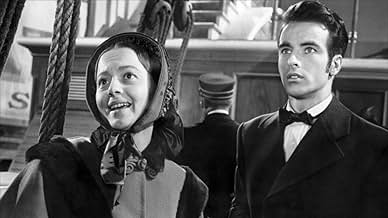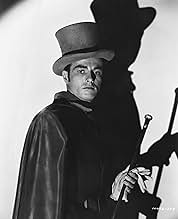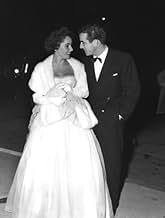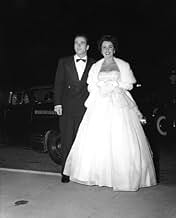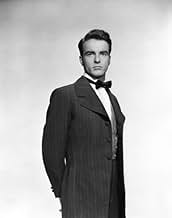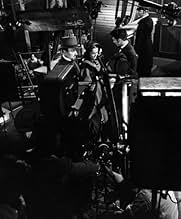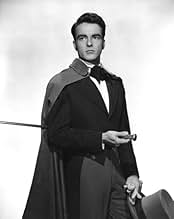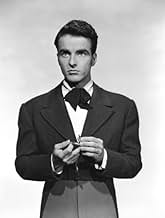AVALIAÇÃO DA IMDb
8,1/10
18 mil
SUA AVALIAÇÃO
Uma jovem ingênua se apaixona por um jovem bonito que seu pai, um abusador emocional, suspeita ser um caçador de fortunas.Uma jovem ingênua se apaixona por um jovem bonito que seu pai, um abusador emocional, suspeita ser um caçador de fortunas.Uma jovem ingênua se apaixona por um jovem bonito que seu pai, um abusador emocional, suspeita ser um caçador de fortunas.
- Direção
- Roteiristas
- Artistas
- Ganhou 4 Oscars
- 13 vitórias e 9 indicações no total
Mary Bayless
- Party Guest
- (não creditado)
Nan Boardman
- French Maid
- (não creditado)
Jack Chefe
- French Waiter
- (não creditado)
Marcel De la Brosse
- French Porter
- (não creditado)
Ray De Ravenne
- French Waiter
- (não creditado)
Avaliações em destaque
To call this film well-acted is like calling "Citizen Kane" a nice movie and Alfred Hitchcock an "okay" director. William Wyler was known for eliciting excellent performances from his actors (he's responsible for them receiving a record 14 Oscars in acting; more than twice as many as any other director) and in "The Heiress" he's in top form. This movie should be played in every acting class ever taught to show the brilliance of subtlety and range of expressions possible when one is conveying a character's inner emotions.
Olivia De Havilland is a beautiful woman, but you believe she's an ungainly bundle of shy awkwardness in the role of Catherine Sloper. And her transformation to a cruel wounded creature is perfectly believable. And Ralph Richardson as Dr. Sloper and Miriam Hopkins as Aunt Lavinia are letter perfect beside her. Sir Ralph (at least, I THINK he was knighted) can do more with stillness and a flick of an eyebrow than any actor I've ever seen (including Brando, Penn and any other method actor you care to toss into the mix). He was robbed at the Oscars.
Montgomery Clift was beautiful and seductive and, except for a couple of moments where he seemed too 1950s instead of 1850s, just right for the part. He almost holds his own with Sir Ralph when they meet to discuss him marrying Catherine, but he did do better work in "A Place In The Sun" and "From Here To Eternity."
Wyler's simplicity and grace in directing only enhanced the story. The use of mirrors to deepen emotional content (as in when Dr. Sloper, now ill, goes to his office after getting the cold shoulder from Catherine) is stunning. So is his willingness to let a scene play out rather than force along the pacing of the moment, as so many directors do, today (as in when Catherine offers to help her father rewrite his will).
There are no easy answers in this movie. You can think Dr. Sloper is right about Morris and only wants to protect his daughter, or you can see his actions as those of a vindictive man who blames her for the death of his beloved wife (in childbirth). Morris could be a fortune hunter, or he could be a man who does care for Catherine, in his own way, and would make her happy. Or all of the above. The whole movie is so beautifully composed, it's breathtaking. A definite must see for anyone who appreciates great stories well-told.
Olivia De Havilland is a beautiful woman, but you believe she's an ungainly bundle of shy awkwardness in the role of Catherine Sloper. And her transformation to a cruel wounded creature is perfectly believable. And Ralph Richardson as Dr. Sloper and Miriam Hopkins as Aunt Lavinia are letter perfect beside her. Sir Ralph (at least, I THINK he was knighted) can do more with stillness and a flick of an eyebrow than any actor I've ever seen (including Brando, Penn and any other method actor you care to toss into the mix). He was robbed at the Oscars.
Montgomery Clift was beautiful and seductive and, except for a couple of moments where he seemed too 1950s instead of 1850s, just right for the part. He almost holds his own with Sir Ralph when they meet to discuss him marrying Catherine, but he did do better work in "A Place In The Sun" and "From Here To Eternity."
Wyler's simplicity and grace in directing only enhanced the story. The use of mirrors to deepen emotional content (as in when Dr. Sloper, now ill, goes to his office after getting the cold shoulder from Catherine) is stunning. So is his willingness to let a scene play out rather than force along the pacing of the moment, as so many directors do, today (as in when Catherine offers to help her father rewrite his will).
There are no easy answers in this movie. You can think Dr. Sloper is right about Morris and only wants to protect his daughter, or you can see his actions as those of a vindictive man who blames her for the death of his beloved wife (in childbirth). Morris could be a fortune hunter, or he could be a man who does care for Catherine, in his own way, and would make her happy. Or all of the above. The whole movie is so beautifully composed, it's breathtaking. A definite must see for anyone who appreciates great stories well-told.
What a lavish history of films we are fortunate enough to have in this country. And I count "The Heiress" as one of the best. Combine a wonderfully told story with a masterful director (William Wyler), and add to that superb cast, and you have the formula for a masterpiece as we do here.
Olivia de Havilland gives the performance of her life as Catherine Sloper, the socially awkward and homely daughter of surgeon Dr. Sloper (played by Ralph Richardson). She brings such a strong performance as her character evolves from a timid, shy and innocent young lady to a hardened, disappointed and bitter woman. I don't know that I have ever seen an actress give such a convincing evolution, before or since. She truly earned her Oscar win for Best Actress. Richardson also delivers a believable performance as the ruthless father that is extremely disappointed in his daughter, and never fails to let her know it. At the same time, there is a hint of fatherly love below the surface trying to protect his daughter from what he perceives is a fortune hunter in the suitor of Montgomery Clift's character, Morris Townsend.
The photography in the film is amazing as it conveys the deep emotions in the film so adequately. You feel Catherine's loneliness and awkwardness, and the scenes involving the elopement, and later the final rejection, are quite hauntingly portrayed.
One of my favorite lines in movies is from this film when Catherine's Aunt tells her "Can you be so cruel?" to which Catherine coldly replies "Yes, I can be very cruel. I have been taught by masters." This is a film you will want to see multiple times to uncover all the layers and details of the very deep and tragic story of "The Heiress".
Olivia de Havilland gives the performance of her life as Catherine Sloper, the socially awkward and homely daughter of surgeon Dr. Sloper (played by Ralph Richardson). She brings such a strong performance as her character evolves from a timid, shy and innocent young lady to a hardened, disappointed and bitter woman. I don't know that I have ever seen an actress give such a convincing evolution, before or since. She truly earned her Oscar win for Best Actress. Richardson also delivers a believable performance as the ruthless father that is extremely disappointed in his daughter, and never fails to let her know it. At the same time, there is a hint of fatherly love below the surface trying to protect his daughter from what he perceives is a fortune hunter in the suitor of Montgomery Clift's character, Morris Townsend.
The photography in the film is amazing as it conveys the deep emotions in the film so adequately. You feel Catherine's loneliness and awkwardness, and the scenes involving the elopement, and later the final rejection, are quite hauntingly portrayed.
One of my favorite lines in movies is from this film when Catherine's Aunt tells her "Can you be so cruel?" to which Catherine coldly replies "Yes, I can be very cruel. I have been taught by masters." This is a film you will want to see multiple times to uncover all the layers and details of the very deep and tragic story of "The Heiress".
10Ritag2
The Heiress has to be one of the greatest movies ever made. There is nothing about it that I would change. The cast is perfect. Montgomery Clift is so wonderful as Morris Townsend. His physical beauty makes it easy to understand how someone as gauche as Catherine Sloper could overcome her shyness and respond to him. Olivia de Havilland is almost too good looking to be the unattractive Miss Sloper, however her great acting overcomes her beauty, and the viewer readily accepts her in the part. Ralph Richardson is perfect as Dr. Sloper. With his disdain for his daughter and his idealization of her dead mother, it is easy to see how his attitude has frozen his daughter in her insecurity about everything that she does. Miriam Hopkins is the perfect airhead social climber who does have affection for her niece, but becomes so wrapped up in the overall romance of the situation that she doesn't act in the best interests of her niece but in the best interests of the romantic drama that is unfolding around her. In her biography, Edith Head talks about researching and designing the clothes for this movie. Certainly the costumes greatly enhance Olivia de Havilland's ability to play this part and be accepted as the plain and graceless Catherine Sloper. A great movie that shouldn't be missed.
I saw this film about 10 years ago and have never forgotten it. Why it is not available on DVD - I just don't understand it.
Olivia de Havilland is heart-breaking as the woman who is so badly treated by her suitors and her father. I felt the portrayal of her father and the cruel way he treats her was so well played out and you could see how her soul is slowly being crushed.
I was so amazed and touched by the film, I went and got the book it is based on, Henry James' Washington Square. It was superb but nothing will make me forget the look on Olivia De Havilland's face at the end of the movie where you can see her features harden and all her youthful sweetness is gone.
Brilliant film!
Olivia de Havilland is heart-breaking as the woman who is so badly treated by her suitors and her father. I felt the portrayal of her father and the cruel way he treats her was so well played out and you could see how her soul is slowly being crushed.
I was so amazed and touched by the film, I went and got the book it is based on, Henry James' Washington Square. It was superb but nothing will make me forget the look on Olivia De Havilland's face at the end of the movie where you can see her features harden and all her youthful sweetness is gone.
Brilliant film!
10dglink
Certainly among the finest literary adaptations, "The Heiress" was based on Henry James's novel, "Washington Square" and features arguably Olivia de Havilland's finest screen performance. Morris Townsend , a handsome young man with ambiguous motives pursues Catherine Sloper, a plain spinster, who is slightly past marriageable age and possesses limited social skills. The young woman, who is the heiress of the title, is vulnerable prey for a penniless fortune hunter.
However, Montgomery Clift plays Townsend in an enigmatic manner, and viewers can debate his true intentions. Catherine's father, played by Ralph Richardson, and her Aunt Lavinia, played by Miriam Hopkins, take opposite sides in Townsend's pursuit of Catherine. Although both her father and her aunt appear to see through the handsome suitor, Aunt Lavinia is practical and sensitive to her niece's emotional needs, and she counsels compromise in pursuit of happiness, if only fleeting. However, Catherine's father is unyielding and essentially unloving in his opposition to the match. Throughout, Dr. Sloper compares his daughter's virtues to those of his late wife, and Catherine comes up lacking in every quality that he values. Sloper threatens to disinherit his daughter if she marries the suitor.
Montgomery Clift may appear shallow and transparent to some, but in essence those are the traits of his character. While Morris is slick and obviously fawning, he is not intelligent enough to be totally deceptive. Only someone as naive and needy as Olivia could fail to grasp that Morris may want something more than her love. Olivia de Havilland transcends her other performances and skillfully and convincingly evolves from a shy, introverted girl into a strong, vengeful woman. De Havilland has often portrayed women who appear genteel and soft on the outside, but whose hearts and backbones can harden into pure steel (e.g. Gone with the Wind; Hush, Hush, Sweet Charlotte), and Catherine Sloper is the finest of those roles. With able support from Richardson and Hopkins, Clift and de Havilland make the most of an outstanding screenplay, which was adapted from a stage play. William Wyler directs with a sure hand, and the atmospheric cinematography captures 19th century New York life. Period films are often unraveled by their hairstyles, which generally owe more to the year in which the film was made rather than that in which the story is set. However, even the coiffures excel in "The Heiress." De Havilland's hair looks authentic 19th century and underscores Wyler's fastidious attention to detail.
With an award-winning de Havilland performance, a handsome Montgomery Clift on the brink of stardom, and an engrossing Henry James story, "The Heiress" is one of the finest films of the 1940's. Without qualification, the film holds up to and merits repeat viewings if only to better argue the underlying motives of Clift and the fateful decision that de Havilland has to make.
However, Montgomery Clift plays Townsend in an enigmatic manner, and viewers can debate his true intentions. Catherine's father, played by Ralph Richardson, and her Aunt Lavinia, played by Miriam Hopkins, take opposite sides in Townsend's pursuit of Catherine. Although both her father and her aunt appear to see through the handsome suitor, Aunt Lavinia is practical and sensitive to her niece's emotional needs, and she counsels compromise in pursuit of happiness, if only fleeting. However, Catherine's father is unyielding and essentially unloving in his opposition to the match. Throughout, Dr. Sloper compares his daughter's virtues to those of his late wife, and Catherine comes up lacking in every quality that he values. Sloper threatens to disinherit his daughter if she marries the suitor.
Montgomery Clift may appear shallow and transparent to some, but in essence those are the traits of his character. While Morris is slick and obviously fawning, he is not intelligent enough to be totally deceptive. Only someone as naive and needy as Olivia could fail to grasp that Morris may want something more than her love. Olivia de Havilland transcends her other performances and skillfully and convincingly evolves from a shy, introverted girl into a strong, vengeful woman. De Havilland has often portrayed women who appear genteel and soft on the outside, but whose hearts and backbones can harden into pure steel (e.g. Gone with the Wind; Hush, Hush, Sweet Charlotte), and Catherine Sloper is the finest of those roles. With able support from Richardson and Hopkins, Clift and de Havilland make the most of an outstanding screenplay, which was adapted from a stage play. William Wyler directs with a sure hand, and the atmospheric cinematography captures 19th century New York life. Period films are often unraveled by their hairstyles, which generally owe more to the year in which the film was made rather than that in which the story is set. However, even the coiffures excel in "The Heiress." De Havilland's hair looks authentic 19th century and underscores Wyler's fastidious attention to detail.
With an award-winning de Havilland performance, a handsome Montgomery Clift on the brink of stardom, and an engrossing Henry James story, "The Heiress" is one of the finest films of the 1940's. Without qualification, the film holds up to and merits repeat viewings if only to better argue the underlying motives of Clift and the fateful decision that de Havilland has to make.
Você sabia?
- CuriosidadesDirector William Wyler shot 37 takes of Olivia de Havilland carrying her suitcases up the stairs. Only after the final shoot, whereupon she briefly stopped on the second flight of stairs and leaned on the handrail for a couple of seconds, did Wyler declare that this was the take he wanted to print.
- Erros de gravaçãoThis story takes place at the end of the 1840s, but none of the men wear the cravats--material bound around the neck and tied in either the front or back--that were fashionable in that period; instead they wear neckties and bow ties, which did not come into fashion until the late 1850s.
- Citações
Aunt Penniman: Can you be so cruel?
Catherine Sloper: Yes, I can be very cruel. I have been taught by masters.
- ConexõesFeatured in AFI Life Achievement Award: A Tribute to William Wyler (1976)
Principais escolhas
Faça login para avaliar e ver a lista de recomendações personalizadas
Detalhes
- Data de lançamento
- País de origem
- Idiomas
- Também conhecido como
- La heredera
- Locações de filme
- Empresa de produção
- Consulte mais créditos da empresa na IMDbPro
Bilheteria
- Orçamento
- US$ 2.600.000 (estimativa)
- Faturamento bruto mundial
- US$ 158
- Tempo de duração1 hora 55 minutos
- Cor
- Proporção
- 1.37 : 1
Contribua para esta página
Sugerir uma alteração ou adicionar conteúdo ausente

Principal brecha
By what name was Tarde Demais (1949) officially released in India in English?
Responda

